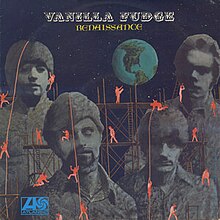This article needs additional citations for verification. (February 2016) |
Renaissance (Atco Records catalog no. [SD] 33-244; originally available in both mono and stereo) is the third album by rock band Vanilla Fudge, released in June 1968. It was their first album to feature mostly original material, with five of its seven tracks penned by band members.
| Renaissance | ||||
|---|---|---|---|---|
 | ||||
| Studio album by | ||||
| Released | June 14, 1968 | |||
| Recorded | Ultra-Sonic Studios, Hempstead, L.I. | |||
| Genre | Psychedelic rock, acid rock | |||
| Length | 40:59 (original LP) 52:02 (1991 CD) 50:06 (1998 CD) | |||
| Label | Atco | |||
| Producer | Shadow Morton | |||
| Vanilla Fudge chronology | ||||
| ||||
In addition to the band's original songs, Renaissance also included "The Spell That Comes After" (written by Frank Zappa's and Herb Cohen's protege Essra Mohawk, but erroneously credited on original pressings of the LP to Zappa's art director Cal Schenkel), and a cover version of "Season of the Witch", originally written and performed by Scottish folk singer Donovan. The band also interpolates lyrics from a second Essra Mohawk song, "We Never Learn", into their rendition of "Season of the Witch".
CD reissues of Renaissance include three additional songs that were originally released as non-LP singles concurrently with the album.
Renaissance peaked at #20 on the Billboard album charts in July 1968. It also reached #8 in Finland.[1]
The single, Season Of The Witch, PT. 1, reached #52 in Canada.[2]
| Review scores | |
|---|---|
| Source | Rating |
| Allmusic | |
Track listing
edit| No. | Title | Writer(s) | Length |
|---|---|---|---|
| 1. | "The Sky Cried/When I Was a Boy" | Mark Stein, Tim Bogert | 7:36 |
| 2. | "Thoughts" | Vince Martell | 3:28 |
| 3. | "Paradise" | Stein, Carmine Appice | 5:59 |
| 4. | "That's What Makes a Man" | Stein | 4:28 |
| No. | Title | Writer(s) | Length |
|---|---|---|---|
| 5. | "The Spell That Comes After" | Essra Mohawk | 4:29 |
| 6. | "Faceless People" | Appice | 5:55 |
| 7. | "Season of the Witch" | Donovan Leitch; interpolating "We Never Learn" by Essra Mohawk | 8:40 |
| No. | Title | Writer(s) | Length |
|---|---|---|---|
| 8. | "You Keep Me Hanging On" (7" version) | Brian Holland, Lamont Dozier | 2:50 |
| 9. | "Come By Day Come By Night" | Stein | 2:53 |
| 10. | "People" | Appice, Stein, Bogert, Martell | 5:16 |
| No. | Title | Writer(s) | Length |
|---|---|---|---|
| 8. | "All in Your Mind" | Appice, Bogert, Martell, Stein | 2:58 |
| 9. | "The Look of Love" | Burt Bacharach, Hal David | 2:49 |
| 10. | "Where Is My Mind" | Stein | 2:44 |
Charts
edit| Chart (1968/70) | Position |
|---|---|
| Australia (Kent Music Report)[4] | 32 |
| United States (Billboard 200) | 20 |
Personnel
edit- Carmine Appice - drums, backing vocals, lead vocal (track 6)
- Tim Bogert - bass guitar, backing vocals, co-lead vocal (track 1)
- Vince Martell - electric guitar, backing vocals, co-lead vocal (track 2), lead vocal (track 7)
- Mark Stein - keyboards, lead vocals (tracks 3, 4 & 5), co-lead vocals (tracks 1 & 2)
References
edit- ^ Nyman, Jake (2005). Suomi soi 4: Suuri suomalainen listakirja (in Finnish) (1st ed.). Helsinki: Tammi. p. 243. ISBN 951-31-2503-3.
- ^ "RPM Top 100 Singles - January 6, 1969" (PDF).
- ^ Renaissance at AllMusic
- ^ Kent, David (1993). Australian Chart Book 1970–1992 (illustrated ed.). St Ives, N.S.W.: Australian Chart Book. p. 319. ISBN 0-646-11917-6.